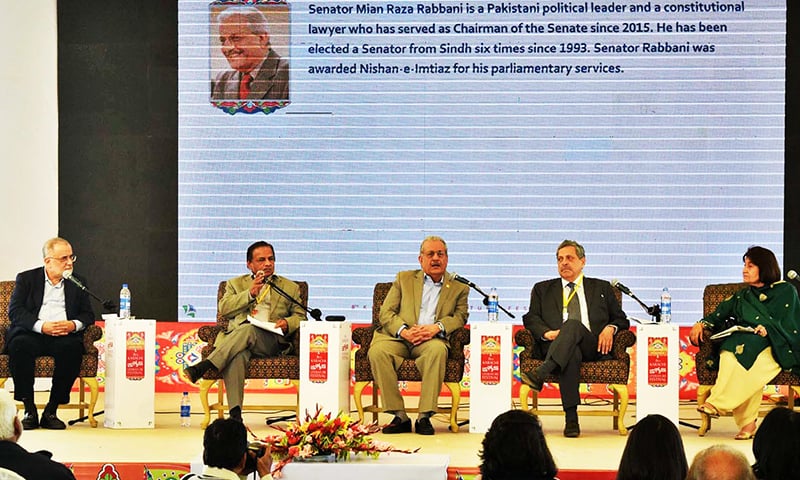KARACHI: A dialogue over the state’s counterterrorism policy and the national narrative led to a momentous question — is the state ready to eliminate terrorism in Pakistan or is national security victim to political interests?
On the second day of the Karachi Literature Festival on Saturday, a session titled ‘Pakistan: a fragile state or resilient nation?’ delivered a set of arguments challenging the country’s foreign and domestic policy.
The panel — moderated by senior journalist Mujahid Barelvi — was comprised of Senate Chairman Mian Raza Rabbani, senior lawyer Hamid Khan, foreign policy commentator Ahmed Rashid and retired Justice Nasira Iqbal.
Reviewing the course of political developments in Pakistan’s history, Mr Rabbani said the country turned into a “garrison state” and its ideology was transformed to give birth to a set of citizens who do not advocate for their rights and question the state. “Pakistan emerged as a welfare and progressive state. In the [recent] past, terrorism of sorts has risen due to shift in national interests,” he said.
Regretting lack of implementation of the National Action Plan (NAP), Mr Rashid said the military action, despite recognising that the problems were internally placed, had been very selective. “The counterterrorism policy is building disunity and is meaningless. We need a coherent national narrative made by all elements of the state, including the civil society,” he said.
Raza Rabbani terms parliament’s involvement in foreign and domestic policymaking ‘cosmetic’
Justice Nasira Iqbal steered the flow of the discussion to the role of the judiciary in decision-making by recalling the success of the lawyers’ movement. “The rule of law has been independent and free ever since,” she said.
Contesting the argument, Hamid Khan referred to a judicial decision whereby military courts were endorsed. “The Panama case is not the first challenge faced by the judicial system. The state’s weakness became evident when its institutions faced a monumental defeat in the name of military courts,” he said.
Echoing his views on the rule of the “invisible state”, Mr Rabbani said parliament’s involvement in decisions pertaining to the foreign and internal policy was “cosmetic” and the executive played a minimal role as well. “Without transparency and accountability of state operations, public and national interest will collide.”
Stressing the need for intra-civilian dialogue within institutions, he said national consensus cannot develop under a multiparty conference or through committee meetings, adding that coordination was required at each level of the government.
Referring to the shift in world politics under US President Donald Trump and uncertainty involving Russia-Pakistan relations, Mr Rashid brought the issue of Pakistan’s stance on regional conflicts to the forefront.
“The [invisible] state now has far more control of foreign policy than ever before and as long as Pakistan uses extremist groups to project foreign policy we’re in trouble,” he said, adding that the China-Pakistan Economic Corridor (CPEC) was not the answer to all regional and national disputes.
“We blame our enemies instead of looking internally, which is why we haven’t been able to build a true narrative against extremism,” said Mr Rashid referring to the Indo-Pak conflict.
Commenting on the matter, Mr Rabbani said, “We must protect strategic interests. No investment [CPEC] comes without strings.”
Contributing to the conversation, Advocate Khan said the country lost East Pakistan because of lack of bilateralism. “We have not learned from the past, and are still struggling to derive a policy that protects the country from regional and national conflicts,” he said.
Responding to a question regarding the issue of missing bloggers and satirical website, Khabaristan Times, being blocked, Mr Rashid said the matter had sent across a chilling message to the media that the state was fragile to resilience.
Published in Dawn, February 12th, 2017













































Dear visitor, the comments section is undergoing an overhaul and will return soon.